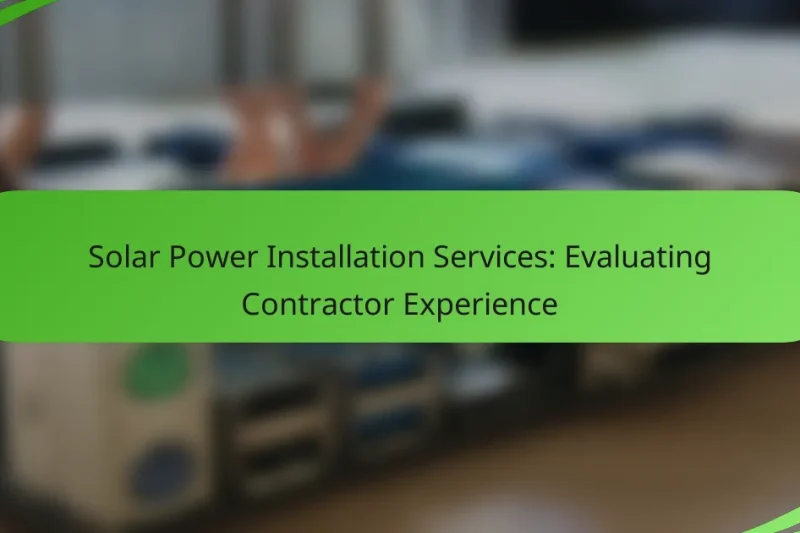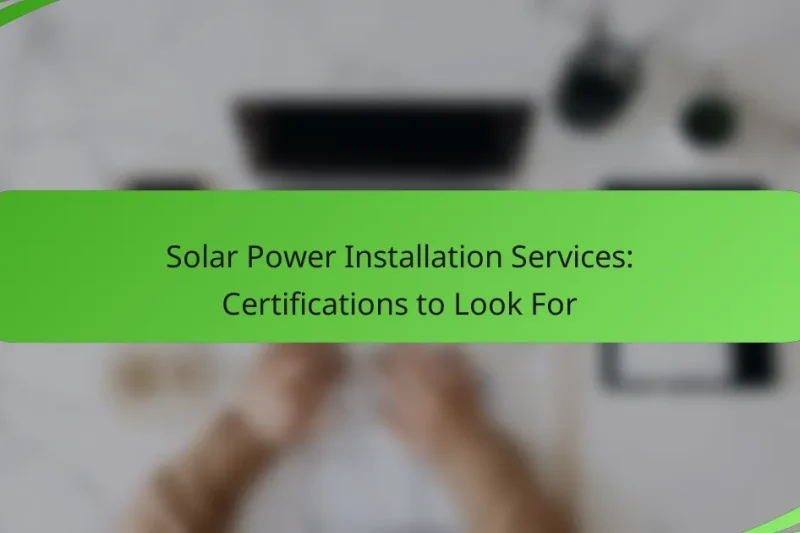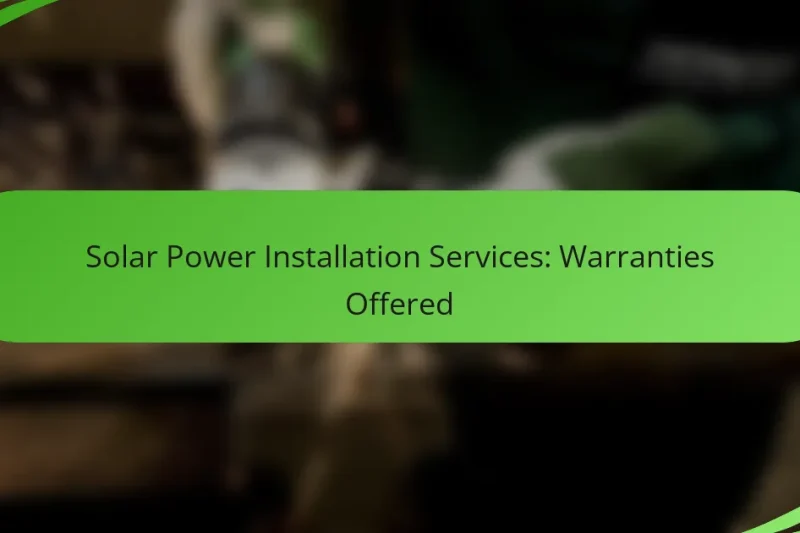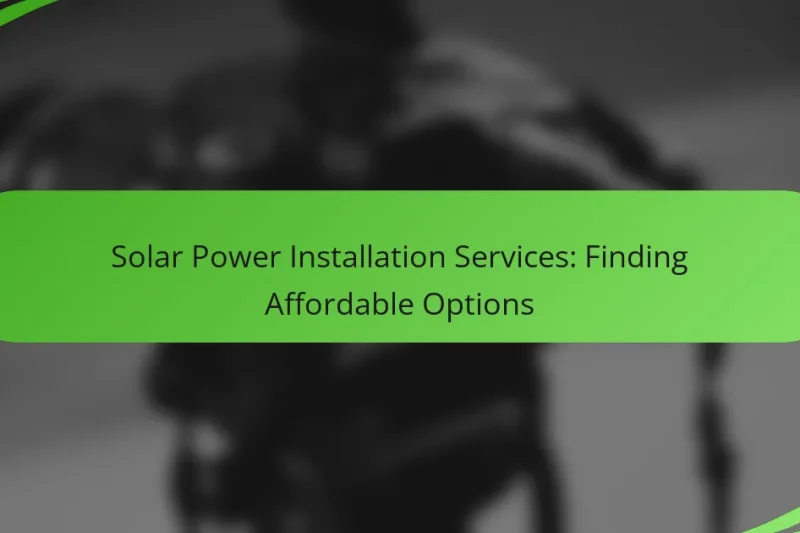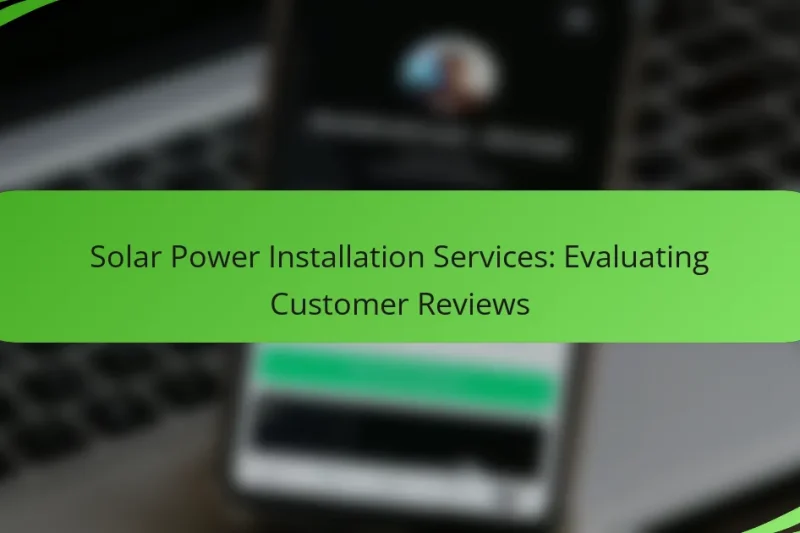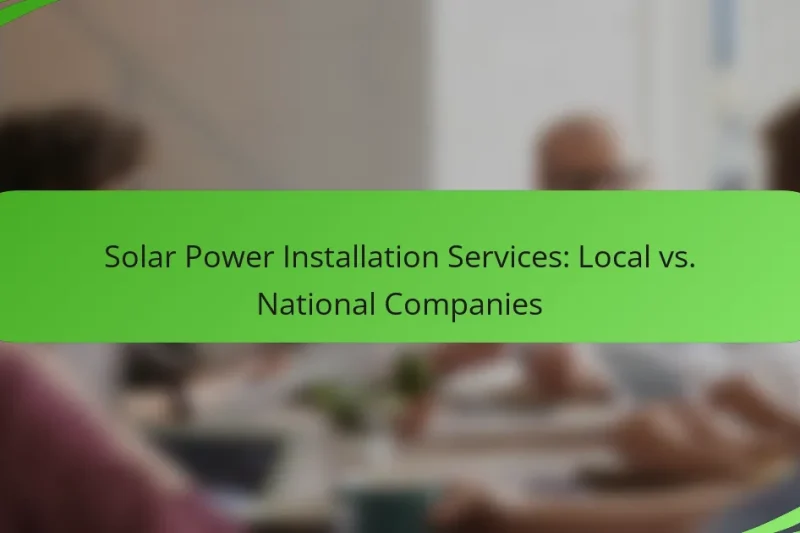When considering solar power installation services, it’s essential to evaluate the experience and qualifications of potential … Solar Power Installation Services: Evaluating Contractor ExperienceRead more
Choosing the Right Solar Power Installation Company
Choosing the right solar power installation company is crucial for maximizing the benefits of your solar energy system. In California, it’s essential to evaluate local expertise, customer feedback, and industry certifications to ensure a reliable installation. Consider factors such as the company’s experience, equipment quality, and available warranties to make an informed decision that will enhance the efficiency and longevity of your solar investment.
Solar Power Installation Services: Key Questions to Ask
Investing in solar power installation services can lead to substantial savings on energy costs while benefiting … Solar Power Installation Services: Key Questions to AskRead more
Solar Power Installation Services: Certifications to Look For
When choosing solar power installation services, it’s essential to look for certifications that reflect industry expertise … Solar Power Installation Services: Certifications to Look ForRead more
Solar Power Installation Services: Warranties Offered
When considering solar power installation services, it’s essential to understand the various warranties available to protect … Solar Power Installation Services: Warranties OfferedRead more
Solar Power Installation Services: Finding Affordable Options
Finding affordable solar power installation services can significantly enhance your home’s energy efficiency while reducing utility … Solar Power Installation Services: Finding Affordable OptionsRead more
Solar Power Installation Services: Evaluating Customer Reviews
When considering solar power installation services, evaluating customer reviews is essential for identifying reliable and high-quality … Solar Power Installation Services: Evaluating Customer ReviewsRead more
Solar Power Installation Services: Local vs. National Companies
When considering solar power installation services, it’s essential to weigh the benefits of local versus national … Solar Power Installation Services: Local vs. National CompaniesRead more
How to choose a solar power installation company in California?
Choosing a solar power installation company in California requires careful consideration of local expertise, customer feedback, and industry certifications. Focus on companies with a strong reputation and proven track records in solar energy projects specific to the California market.
Research local companies
Start by identifying solar installation companies that operate within your area. Local companies are more likely to understand California’s specific regulations, incentives, and climate conditions, which can affect solar performance.
Look for companies that have been in business for several years and have completed numerous installations. You can use online directories or local business listings to compile a list of potential candidates.
Check customer reviews
Customer reviews provide valuable insights into the quality of service and installation provided by solar companies. Check platforms like Yelp, Google Reviews, and the Better Business Bureau for feedback from previous clients.
Pay attention to recurring themes in reviews, such as responsiveness, professionalism, and post-installation support. A company with consistently positive reviews is more likely to deliver a satisfactory experience.
Evaluate certifications
Certifications can indicate a company’s level of expertise and commitment to quality. Look for companies that are certified by the North American Board of Certified Energy Practitioners (NABCEP), which is a recognized standard in the solar industry.
Additionally, check if the company is licensed and insured in California. This not only protects you as a consumer but also ensures that the company adheres to state regulations and safety standards.
What are the key factors in selecting a solar installer?
When selecting a solar installer, consider their experience, the quality of the equipment they offer, and the warranty and maintenance options available. These factors significantly influence the efficiency, reliability, and longevity of your solar power system.
Experience in solar installations
Experience is crucial when choosing a solar installer. Look for companies with a proven track record of successful installations, ideally with several years in the industry. A well-established installer is likely to have encountered various challenges and can navigate them effectively.
Check for customer reviews and testimonials to gauge their reputation. Additionally, inquire about the number of installations they have completed and any certifications or training their technicians possess, as these can indicate a higher level of expertise.
Quality of equipment offered
The quality of solar panels and inverters can vary significantly among manufacturers. Choose an installer that offers high-efficiency panels from reputable brands, as this can impact your system’s performance and energy savings. Look for products that have been tested and certified by recognized standards.
Consider the warranty terms for the equipment as well. A longer warranty typically indicates greater confidence in the product’s durability. Aim for panels with warranties of at least 25 years, as this reflects their expected lifespan and reliability.
Warranty and maintenance options
Warranties and maintenance options are essential for protecting your investment in solar energy. Ensure the installer provides comprehensive warranties that cover both the equipment and the installation work. A good warranty should last at least 10 years for installation and 25 years for the solar panels.
Additionally, inquire about ongoing maintenance services. Regular maintenance can help optimize system performance and address any issues promptly. Some companies offer maintenance packages that include inspections and cleaning, which can be beneficial for long-term efficiency.
What are the costs associated with solar power installation?
The costs associated with solar power installation can vary significantly based on factors such as system size, equipment quality, and installation complexity. Generally, homeowners can expect to invest tens of thousands of dollars, but financing options and incentives can help reduce the overall expense.
Average installation costs in Texas
In Texas, the average cost of solar panel installation typically ranges from $15,000 to $30,000 for a residential system. This price can fluctuate based on the size of the system and the specific equipment chosen. It’s essential to obtain multiple quotes from different companies to ensure competitive pricing.
Homeowners should also consider the long-term savings on energy bills when evaluating installation costs. Many find that the investment pays off within a few years due to reduced utility expenses.
Financing options available
Several financing options exist for solar power installation, including solar loans, leases, and power purchase agreements (PPAs). Solar loans allow homeowners to own the system and benefit from tax credits and incentives, while leases and PPAs typically involve lower upfront costs but may limit ownership benefits.
Homeowners should assess their financial situation and long-term goals when choosing a financing option. Comparing interest rates and terms from different lenders can help secure the best deal.
Government incentives and rebates
Government incentives and rebates can significantly reduce the cost of solar power installation. In the U.S., the federal solar tax credit allows homeowners to deduct a percentage of the installation costs from their federal taxes. Additionally, many states and local governments offer their own rebates and incentives.
It’s crucial to research available incentives in your area, as they can vary widely. Websites like the Database of State Incentives for Renewables & Efficiency (DSIRE) can provide up-to-date information on local programs and financial benefits.
How to assess the reputation of a solar company?
To assess the reputation of a solar company, consider their industry certifications, customer feedback, and overall experience. A reputable company will have a track record of successful installations and satisfied clients, which can be evaluated through various sources.
Industry certifications and affiliations
Check for industry certifications such as the North American Board of Certified Energy Practitioners (NABCEP) or local equivalents, as these indicate a commitment to quality and professionalism. Affiliations with reputable organizations can also enhance a company’s credibility.
Additionally, look for any awards or recognitions the company has received within the solar industry. These accolades often reflect a company’s dedication to excellence and customer satisfaction.
Customer testimonials and case studies
Customer testimonials provide insight into the experiences of previous clients. Look for reviews on independent platforms, as these are often more reliable than those on the company’s website. Aim for a mix of positive and negative feedback to get a balanced view.
Case studies can offer detailed examples of past projects, showcasing the company’s ability to handle different types of installations. Pay attention to the specifics of these projects, including challenges faced and how they were overcome, as this can reveal the company’s problem-solving skills.
What questions should you ask potential solar installers?
When evaluating solar installers, it’s crucial to ask specific questions that reveal their expertise and reliability. Focus on their experience, warranty offerings, and customer service to ensure you choose a reputable company.
What is the installation timeline?
The installation timeline for solar power systems can vary significantly based on the complexity of the project and local regulations. Generally, you can expect the process to take anywhere from a few weeks to a couple of months, depending on factors like permitting and weather conditions.
Ask the installer for a detailed schedule that outlines each phase of the installation, including design, permitting, and actual installation. This will help you set realistic expectations and plan accordingly.
What is the expected energy output?
Understanding the expected energy output is essential for assessing the system’s efficiency and return on investment. Most installers will provide estimates based on your location, roof orientation, and system size.
Request a performance estimate that includes potential energy savings and payback periods. This information will help you determine if the investment aligns with your energy needs and financial goals.
How do you handle permits and inspections?
Permits and inspections are critical steps in the solar installation process, ensuring compliance with local building codes and regulations. A reputable installer should manage these tasks on your behalf, streamlining the process for you.
Inquire about the specific permits required in your area and how the installer will handle inspections. This will give you confidence that your installation will meet all necessary legal standards and avoid potential delays.
What are the benefits of going solar in Florida?
Going solar in Florida offers significant advantages, including substantial energy savings and a positive environmental impact. With ample sunshine year-round, solar energy systems can effectively reduce electricity bills and contribute to a cleaner planet.
Long-term energy savings
Investing in solar power can lead to considerable long-term savings on energy costs. Homeowners can expect to reduce their monthly electricity bills significantly, often by 50% or more, depending on their energy consumption and the size of the solar system installed.
Additionally, Florida offers various incentives, such as the federal solar tax credit, which allows homeowners to deduct a percentage of the installation costs from their federal taxes. This can further enhance the financial benefits of going solar.
Environmental impact reduction
Switching to solar energy helps decrease reliance on fossil fuels, which are major contributors to greenhouse gas emissions. By harnessing solar power, Floridians can significantly lower their carbon footprint and contribute to a more sustainable future.
Moreover, solar installations can promote local job creation in the renewable energy sector, fostering economic growth while supporting environmental conservation efforts. This dual benefit makes solar power an attractive option for both homeowners and the community at large.
How does solar panel technology impact installation choices?
Solar panel technology significantly influences installation decisions by determining efficiency, cost, and suitability for various environments. Different types of solar panels have unique characteristics that affect their performance and installation requirements, making it essential to choose the right technology for your specific needs.
Types of solar panels available
There are primarily three types of solar panels: monocrystalline, polycrystalline, and thin-film. Monocrystalline panels are known for their high efficiency and space-saving design, making them ideal for residential installations where roof space is limited. Polycrystalline panels are generally less expensive but require more space due to their lower efficiency.
Thin-film solar panels are lightweight and flexible, which allows for versatile installation options, but they typically have lower efficiency compared to crystalline panels. When selecting a type, consider factors such as available roof space, budget, and aesthetic preferences.
It’s also important to evaluate the warranty and lifespan of each panel type. Monocrystalline panels often come with longer warranties and can last over 25 years, while polycrystalline and thin-film panels may have shorter lifespans. Assessing these factors will help ensure a suitable choice for your solar power installation.
